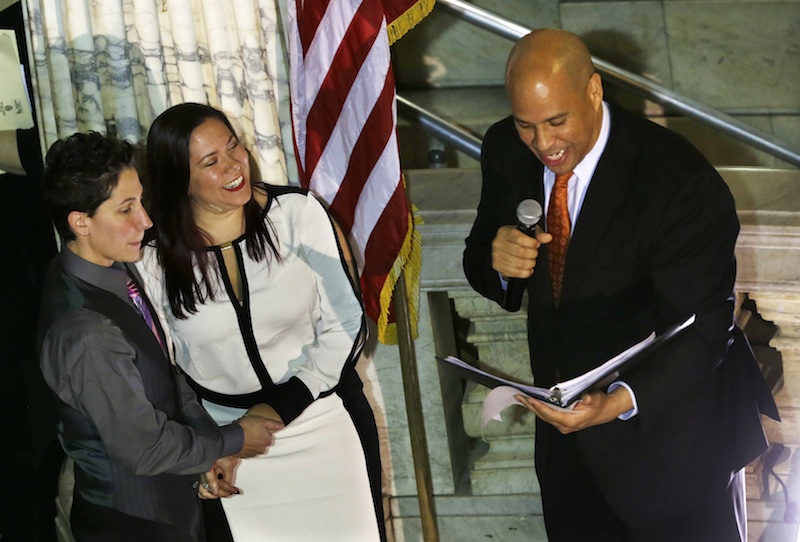Thanks to a pair of court decisions, New Mexico and Utah became the 17th and 18th states to legalize same-sex marriage. Utah’s case in particular is interesting, because in it a federal judge, citing recent Supreme Court rulings, found that same sex couples have a right to marry under the 14th Amendment’s promise of equal protection.
In the midst of celebration by same-sex marriage supporters, it is important to note that many lesbian, gay, bisexual and transgender (LGBT) people live in one of the 32 states where they cannot enjoy the full rights and benefits associated with marriage. Two out of every three Americans still live in a state without marriage equality.
Activists and scholars have long made moral and economic arguments for same-sex marriage. Now, there’s a new point to add: a growing body of public health research shows that legalizing same-sex marriage has health benefits.
Denying legal recognition to gay partnerships reduces access to affordable health insurance. Most Americans, some 55 percent, are covered through their own or a family member’s employer-sponsored health insurance plan. But many employers do not extend coverage to same-sex partners or children of same-sex partners. Even among large companies with more than 500 employees, only half offer health benefits to same-sex partners. While Obamacare is on everyone’s minds, few people are thinking about how the absence of legal same-sex marriage in 32 states creates an additional obstacle to making sure that all Americans have health insurance.
When states adopt legal same-sex marriage or legalize civil unions, many workplaces offering health insurance are often required to treat married same-sex couples like married heterosexual couples. But most states still discriminate, and several research studies have found disparities in physical and mental health and access to health care for lesbian, gay, and bisexual people living in states that ban same-sex marriage.
Research on marriage and health reports a consistent finding: married people live happier, healthier and longer lives. Consequently, expanding and supporting marriage for same-sex couples should enable lesbian, gay, and bisexual adults to live happier, healthier and longer lives. In fact, studies conducted in states that have adopted same-sex marriage have already established significant improvements in health and access to care.
A study in Massachusetts followed a group of gay and bisexual men before and after the legalization of same-sex marriage and discovered that these men were less likely to need mental health or medical care visits.
Two studies in California found that lesbian, gay, and bisexual adults who were in state-sanctioned partnerships or married following the California Supreme Court ruling in favor of same-sex marriage reported less psychological distress and were more likely to gain health insurance coverage.
The health benefits from legal same-sex marriage extend beyond LGBT adults. There are over 220,000 children in the United States being raised by same-sex parents. Employers who offer health insurance to dependent children often require minors to be related to the employee by birth, legal marriage or legal adoption. Thus, children in states that do not allow legal marriages or adoptions for lesbian and gay couples are left with diminished protections.
A study recently reported in Pediatrics found that children with same-sex parents were less likely to have private health insurance than children with heterosexual parents. The study also found that disparities in private insurance coverage diminished for children of same-sex parents living in states with either marriage equality or laws supporting gay and lesbian adoptions.
There is some good news for LGBT families in Obamacare. Like all other families, the subsides provided through the insurance exchanges will help working LGBT families afford health insurance. Obamacare also prohibits health insurance companies from denying coverage because of sexual orientation, transgender identity and pre-existing conditions like HIV. But Obamacare does not require that employers offer equal coverage to same-sex partners in states where same-sex marriage is not legal.
Given political gridlock in Congress, states are more likely than the federal government to advance protections for members of gay, lesbian, and bisexual families. Public opinion is shifting rapidly in support of same-sex marriage. While some states may move directly to legalizing same-sex marriage through the courts, their legislatures, or through ballot initiatives, other states may take incremental steps in the form of measures that garner strong public support. Such steps include anti-discrimination laws in housing and employment; rights of legal adoption by gay and lesbian couples; anti-bullying laws to protect gay youth from harassment; and inclusion of crimes against gays, lesbians, bisexual and transgender people in anti-crime legislation. Each of these steps can reduce discrimination and lead to improvements in mental and physical health.
Regardless of which path states follow toward equality, the health benefits associated with same-sex marriage cannot be overlooked. These benefits should always be highlighted as debates continue in legislative chambers, election contests, and federal and state courtrooms.
Gilbert Gonzales is a PhD Student in Health Policy and Management at the University of Minnesota and a member of the Scholars Strategy Network.






